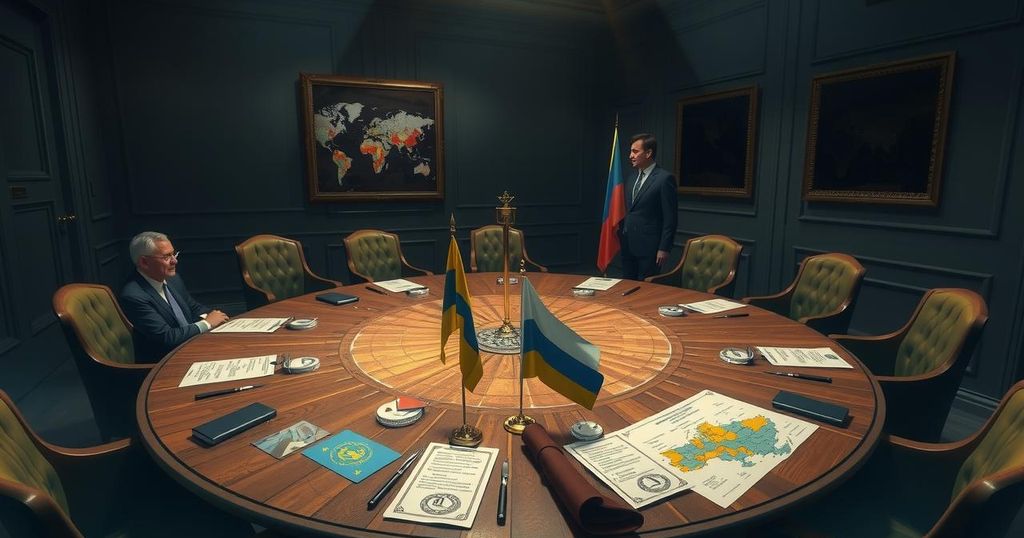World news
ALI, ALIND CHAUHAN, ASIA, DEFENCE, DONALD TRUMP, EUROPE, EUROPE/ASIA, FAR EAST, INDIA, IR, IRKUTSK, ISTANBUL, MILITARY, MISSILE ATTACK, MOSCOW, NATO, NORTH AMERICA, NORTH ATLANTIC TREATY ORGANIZATION, PUTIN, RUSSIA, RUSSIAN INVASION OF UKRAINE, SIBERIA, TURKEY, UKRAINE, UNITED STATES, VOL, VOLODYMYR ZELENSKYY, WAR
Marcus Chen
0 Comments
What Ukraine’s Drone Attack on Russia Means for Peace Talks
Ukraine’s recent drone attacks on Russian airfields signify a dangerous escalation in the conflict, occurring just before peace discussions, which have yielded minimal constructive outcomes. The attacks could stir concerns in Moscow regarding nuclear facilities, heightening military tensions. Current negotiations are mired in disagreement over ceasefire terms and strategic aims, with both sides under external pressure for resolution without clear pathways established.
In a significant escalation, Ukraine launched a substantial drone attack on Russian air assets just a day before the second round of peace talks in Istanbul. The negotiations were brief, concluding in under an hour, with the two sides only agreeing on exchanging thousands of casualties, but failing to reach any agreement to cease hostilities. Earlier talks in mid-May yielded similar results, showing no advancement towards a peaceful resolution of the ongoing conflict.
This latest strike marks a noteworthy increase in Ukrainian drone operations, targeting at least five airfields within Russia’s borders, including locations deep in Siberia. It comes as considerable surprise, as these drone strikes are the first of their magnitude aimed at such crucial military infrastructure and signify a strategic shift in Ukraine’s operational capabilities.
If any of the attacked sites contained facilities associated with Russia’s nuclear capabilities, such as strategic bombers or nuclear weapons, Moscow would certainly take a serious stance. To this point in the conflict, Ukraine had not targeted these sensitive locations, partly due to the understanding that Russia will refrain from deploying nuclear arms unless NATO intervenes directly.
Military analysts speculate on the potential implications of these drone strikes. They suggest Russia may be concerned about whether this was an audacious move from Ukraine, potentially influenced by NATO, or solely a Ukrainian effort to rally support from international powers, possibly hoping to gain favor with U.S. leaders. Drones, as sophisticated weapons, typically require navigation assistance, which could imply external support.
The battle for domination in the air has been relentless. Ukrainian drones attempted to launch strikes on Moscow during the May 9 Victory Day parade, attended by over 20 international leaders. The depth of Ukrainian operations into Russian territory, particularly the strikes in the Irkutsk region, is unexpected and highlights Ukraine’s evolving tactics.
While the Russian political landscape remains supportive of President Putin, concerns among military strategists about Ukraine’s operational depth may arise. Nevertheless, from a political standpoint, analysts suggest that Putin will largely dismiss these drone attacks’ immediate impact on his leadership.
As both nations continue to mull the potential for dialogue, there remain fundamental disagreements. Ukraine demands a month-long ceasefire before negotiations commence, a stance supported by many Western nations, barring the United States. On the other hand, Russia insists that a ceasefire must come with concrete terms for a long-term resolution, based on issues of Ukraine’s neutrality and protection for Russian-speaking citizens within Ukraine.
Amid the complexities, both sides are apparently under U.S. pressure to find common ground. The negotiations currently involve lower-level officials rather than high-ranking diplomats with decision-making power. Russian negotiations are led by Vladimir Medinsky, a former Cultural Minister, while Ukraine is represented by Defence Minister Rustem Umerov.
The outcome remains uncertain, as the preliminary discussions aim to narrow differences rather than finalize terms. With tensions still running high, the future of peace talks hinges on resolving the fundamental issues that fuel the conflict.
In summary, Ukraine’s drone attacks on Russian military targets mark a significant shift in tactics, occurring right before crucial peace talks. While the immediate implications for both military operations and political stability are uncertain, ongoing discussions are hampered by fundamental disagreements about ceasefire terms and strategic objectives. Analysts remain skeptical about the potential for meaningful dialogue as both sides grapple with their respective demands ahead of further negotiations.
Original Source: indianexpress.com




Post Comment